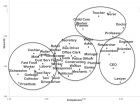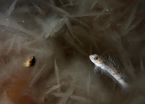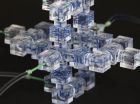(Press-News.org) PRINCETON, N.J.—If scientists want the public to trust their research suggestions, they may want to appear a bit "warmer," according to a new review published by Princeton University's Woodrow Wilson School of Public and International Affairs.
The review, published in the Proceedings of the National Academy of Sciences (PNAS), shows that while Americans view scientists as competent, they are not entirely trusted. This may be because they are not perceived to be friendly or warm.
In particular, Americans seem wary of researchers seeking grant funding and do not trust scientists pushing persuasive agendas. Instead, the public leans toward impartiality.
"Scientists have earned the respect of Americans but not necessarily their trust," said lead author Susan Fiske, the Eugene Higgins Professor of Psychology and professor of public affairs. "But this gap can be filled by showing concern for humanity and the environment. Rather than persuading, scientists may better serve citizens by discussing, teaching and sharing information to convey trustworthy intentions."
Fiske has long studied the psychology behind individual intent and motivation. Her research demonstrates that, while expertise is an essential ingredient for credibility, appearing trustworthy is equally as important. Humans are hardwired to detect intent, quickly determining who is friend or foe. And they trust others that seem like themselves, deeming them as warm and trustworthy. Eventually, a person will decide whether the other individual is competent enough to act on their intentions.
Fiske has applied her work to a number of datasets, evaluating professions across a wide spectrum. Into four clusters, she and Dupree have broken down the perceptions Americans have regarding typical jobs in the United States. These perceptions differ on being warm and trustworthy, as well as competent and capable.
To understand how the public responds to science communicators, Fiske and Cydney Dupree, a Princeton graduate student studying psychology and social policy, tested their ideas in two phases. First, they asked an online sample of adult volunteers to list typical American jobs. From that, the researchers honed the list to the 42 most commonly mentioned jobs, which included scientists, researchers, professors and teachers.
Fiske and Dupree then polled a new group of adults about these jobs, asking them to rate the professions based on how American society views them regarding warmth and competence. This method was chosen deliberately, as it allowed Fiske and Dupree to get a better sense of people's reports of public images of groups. This also reduces the many biases attached with reporting one's own individual stereotypes.
Professionals that appear to be caring – such as teachers, nurses and doctors – are seen as both warm and competent. They evoke emotions like pride and admiration. On the opposite end of the spectrum are professions such as prostitutes, garbage collectors, and dishwashers, who are seen as having low warmth and low competence. This reportedly brings forth contempt or disgust by most Americans. The remaining two categories involved somewhat mixed emotions. For example, scientists, engineers and lawyers are seen as competent, but they are not seen as warm. This brings forth emotions like envy and distrust among Americans. Other professions, such as writers, police and bus drivers, are relatively neutral in terms of both warmth and competence. And the final quadrant includes groups that are "pitied," like the unemployed, who are perceived to have high warmth but low competence.
"Science communicators arguably need to know about this possible type of response to them," said Fiske. "From this view, scientists may seem not so warm. Their intent is not necessarily trusted and maybe even resented."
Focusing on scientific communication, Fiske and Dupree administered another online survey asking adults to describe public attitudes toward climate scientists specifically to provide a clearer picture of the public's seemingly mixed feelings. The researchers used a seven-scale item of distrust that included motives derived from pilot work on scientists' alleged motives. These included such motives as lying with statistics, complicating a story, showing superiority, gaining research money and pursuing a liberal agenda, among others.
In the end, the results run mixed; climate scientists earn a not-terrible mean of 2.16 on a five-point scale of distrust. Responses varied, with some being more distrustful than others. And, among the aforementioned motives, it appears that gaining research money is the Achilles' heel, scoring high above the midpoint as a risk factor for public distrust.
Overall, Fiske and Dupree's work shows that climate scientists seem to be less suspect than pure scientists and researchers. In particular, scientists whose jobs involve teaching and communicating may seem warmer and more trustworthy, seeming to show worthy intentions.
"People are not idiots. The public's issue with science is not necessarily ignorance," said Fiske. "So, the road to communicating climate science starts with some advantages. The public has some knowledge. Climate science communicators have effectively conveyed much evidence, which should encourage their continuing to educate and communicate. Just like other communication, science communication needs to continue to convey warmth and trustworthiness, along with competence and expertise."
INFORMATION:
The paper, "Gaining trust as well as respect in communicating to motivated audiences about science topics," was published online Sept. 16 in PNAS. The illustrative research was supported by the Princeton Institute for International and Regional Studies Communicating Uncertainty Project. Dupree's work was supported by a National Science Graduate Fellowship and the Princeton Joint Degree Program in Psychology and Social Policy.
To read more Wilson School research briefs, visit http://wws.princeton.edu/faculty-research/research-briefs.
Scientists seen as competent but not trusted by Americans
2014-09-22
ELSE PRESS RELEASES FROM THIS DATE:
We drink more alcohol on gym days
2014-09-22
Thursdays to Sundays are when people both exercise more and drink more
Study used smartphones to record daily alcohol intake and physical activity
Findings differ from past research on physical activity and exercise
CHICAGO --- A new Northwestern Medicine® study finds that on days when people exercise more -- typically Thursdays to Sundays -- they drink more alcohol, too.
This is the only study to use smartphone technology and a daily diary approach for self-reporting physical activity and alcohol use.
"Monday through Wednesday people batten down the hatches ...
The fine line between breast cancer and normal tissues
2014-09-22
Boston, MA – Up to 40 percent of patients undergoing breast cancer surgery require additional operations because surgeons may fail to remove all the cancerous tissue in the initial operation. However, researchers at Brigham and Women's Hospital (BWH) have successfully tested a tool they developed that will help surgeons better distinguish cancerous breast tissue from normal tissue, thereby decreasing the chances for repeat operations.
The study is published online the week of September 22, 2014 in the Proceedings of the National Academy of Sciences.
The tool, known ...
Plant variants point the way to improved biofuel production
2014-09-22
Manufacturing biofuels from food crop by-products such as straw could be made quicker and cheaper thanks to the work of scientists in the UK and France.
Researchers funded by the Biotechnology and Biological Sciences Research Council (BBSRC) have discovered variant straw plants whose cell walls are more easily broken down to make biofuels, but which are not significantly smaller or weaker than regular plants.
The discovery could help ease pressure on global food security as biofuels from non-food crops become easier and cheaper to make.
The impact of carbon emissions ...
Study: Antifreeze proteins in Antarctic fishes prevent freezing…and melting
2014-09-22
CHAMPAIGN, Ill. — Antarctic fishes that manufacture their own "antifreeze" proteins to survive in the icy Southern Ocean also suffer an unfortunate side effect, researchers report: The protein-bound ice crystals that accumulate inside their bodies resist melting even when temperatures warm.
The finding is reported in the Proceedings of the National Academy of Sciences.
"We discovered what appears to be an undesirable consequence of the evolution of antifreeze proteins in Antarctic notothenioid fishes," said University of Oregon doctoral student Paul Cziko, who led ...
Healthy lifestyle choices may dramatically reduce risk of heart attack in men
2014-09-22
WASHINGTON (Sept. 22, 2014) — Following a healthy lifestyle, including maintaining a healthy weight and diet, exercise, not smoking and moderating alcohol intake, could prevent four out of five coronary events in men, according to a new study publishing today in the Journal of the American College of Cardiology.
While mortality from heart disease has declined in recent decades, with much of the reduction attributed to medical therapies, the authors said prevention through a healthy lifestyle avoids potential side effects of medication and is more cost effective for population-wide ...
Immune response turned up, not down, by flu during pregnancy, Stanford/Packard study finds
2014-09-22
Pregnant women have an unusually strong immune response to influenza, an unexpected finding that may explain why they get sicker from the flu than other healthy adults, new research from the Stanford University School of Medicine and Lucile Packard Children's Hospital Stanford has found.
The results were surprising because immune responses are thought to be weakened by pregnancy to prevent the woman's body from rejecting her fetus.
The study, which will be published online Sept. 22 in the Proceedings of the National Academy of Sciences, is the first to examine the ...
Firelight talk of the Kalahari Bushmen
2014-09-22
SALT LAKE CITY, Sept. 22, 2014 – After human ancestors controlled fire 400,000 to 1 million years ago, flames not only let them cook food and fend off predators, but also extended their day.
A University of Utah study of Africa's Kalahari Bushmen suggests that stories told over firelight helped human culture and thought evolve by reinforcing social traditions, promoting harmony and equality, and sparking the imagination to envision a broad sense of community, both with distant people and the spirit world.
Researchers previously studied how cooking affected diets and ...
University of Utah engineers unlock potential for faster computing
2014-09-22
SALT LAKE CITY, Sept. 22, 2014 – University of Utah engineers discovered a way to create a special material – a metal layer on top of a silicon semiconductor – that could lead to cost-effective, superfast computers that perform lightning-fast calculations but don't overheat.
This new "topological insulator" behaves like an insulator on the inside but conducts electricity on the outside and may pave the way for quantum computers and fast spintronic devices.
The research, led by University of Utah materials science and engineering professor Feng Liu, was published today ...
Lego-like modular components make building 3-D 'labs-on-a-chip' a snap
2014-09-22
Thanks to new LEGO®-like components developed by researchers at the USC Viterbi School of Engineering, it is now possible to build a 3-D microfluidic system quickly and cheaply by simply snapping together small modules by hand.
Microfluidic systems are used in many fields including engineering, chemistry and biotechnology to precisely manipulate small volumes of fluids for use in applications such as enzymatic or DNA analysis, pathogen detection, clinical diagnostic testing, and synthetic chemistry. Traditionally, microfluidic devices are built in a cleanroom on a two-dimensional ...
Platelets modulate clotting behavior by 'feeling' their surroundings
2014-09-22
Platelets, the tiny cell fragments whose job it is to stop bleeding, are very simple. They don't have a cell nucleus. But they can "feel" the physical environment around them, researchers at Emory and Georgia Tech have discovered.
Platelets respond to surfaces with greater stiffness by increasing their stickiness, the degree to which they "turn on" other platelets and other components of the clotting system, the researchers found.
"Platelets are smarter than we give them credit for, in that they are able to sense the physical characteristics of their environment and ...





